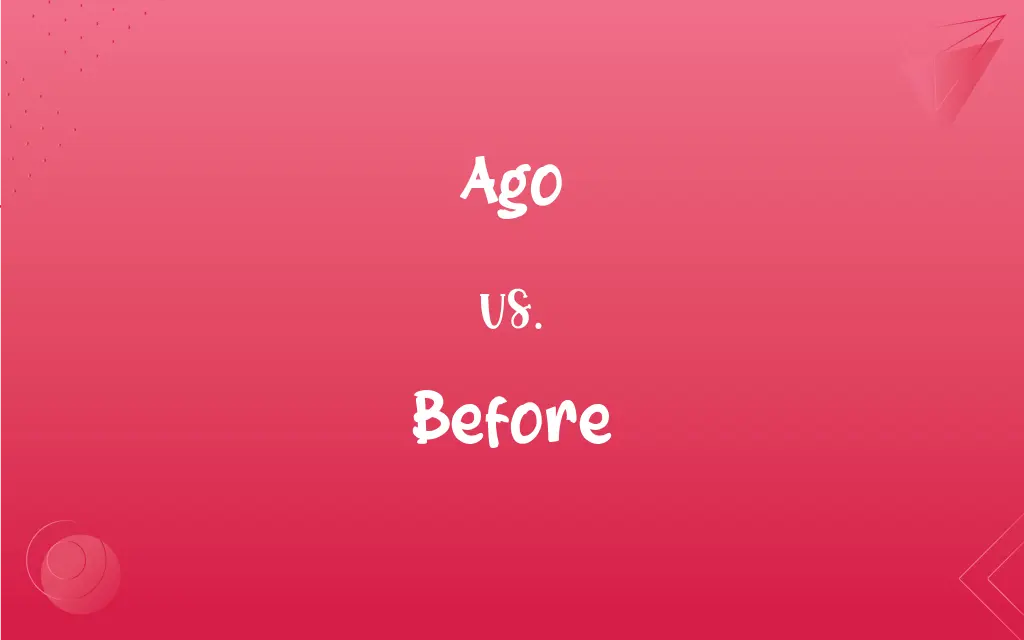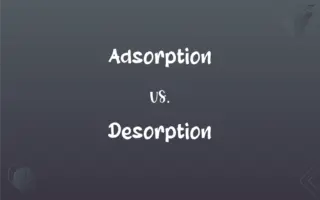Ago vs. Before: What's the Difference?
Edited by Aimie Carlson || By Janet White || Published on December 22, 2023
"Ago" is used to indicate a past time measured from the present, while "before" refers to any time prior to a specific point or event.

Key Differences
"Ago" is used exclusively to describe a past time relative to the present moment, such as "two days ago", whereas "before" can refer to any past time relative to another event, as in "before the meeting".
"Ago" often follows a specific amount of time, emphasizing the duration from now, like "five years ago". "Before" can be more flexible, not necessarily tied to a precise time, as in "long before now".
"Ago" is primarily used in the context of how much time has passed since an event, whereas "before" can indicate a sequence of events or a position in time, such as "before dawn".
The use of "ago" is confined to past tense constructions, while "before" can be used in various tenses to show precedence in time or order.
"Ago" quantifies the past in a linear way, counting back from the present, while "before" is more versatile, used in contexts ranging from temporal sequencing to stating preferences, like "before anything else".
ADVERTISEMENT
Comparison Chart
Temporal Relation
Relative to the present moment
Relative to any specific point or event
Typical Usage
Follows a specific amount of time
Can be used without specifying time
Context
Used in past tense constructions
Used in various tenses
Sequence Indication
Indicates elapsed time
Indicates precedence in time or order
Flexibility
Less flexible, quantifies the past
More flexible, various contexts
ADVERTISEMENT
Ago and Before Definitions
Ago
Referring to a specific point in the past.
Ten minutes ago, I was at home.
Before
In front of, spatially or temporally.
The actors stood before the audience.
Ago
Used to measure time backward.
She moved here two years ago.
Before
Prior to a certain time or event.
Finish your homework before dinner.
Ago
Indicating past time from the present.
The concert ended an hour ago.
Before
Indicating precedence in order or time.
The number seven comes before eight.
Ago
Expressing elapsed time.
It happened ages ago.
Before
Earlier than; sooner than.
Arrive before the gates close.
Ago
Used after a duration of time.
A few days ago, we met to discuss the project.
Before
In preference to.
She would choose reading before watching TV.
Ago
Gone by; past
Two years ago.
Before
Earlier in time
They called me the day before.
Ago
In the past
It happened ages ago.
Ago
Gone; gone by; gone away; passed; passed away.
In days ago/in days agone
Ago
Nearly gone; dead 19th century]]
Woe the day- she is agone!
Ago
Before
When they first met in 2000, my dad told my mom how he had gotten the money. The story begins 20 years ago.
Ago
Past; gone by; since; as, ten years ago; gone long ago.
Ago
Gone by; or in the past;
Two years ago
`agone' is an archaic word for `ago'
Ago
In the past;
Long ago
Sixty years ago my grandfather came to the U.S.
FAQs
Can "ago" be used for future events?
No, "ago" is exclusively used for past events.
Is "ago" always related to the present?
Yes, "ago" always measures time from the present.
Does "ago" imply a specific point in time?
"Ago" indicates a general past time, not a specific moment.
Can "before" be used spatially?
Yes, "before" can indicate position in space as well as time.
Can "ago" be used without a time duration?
No, "ago" typically requires a preceding time duration.
Is "ago" used in formal writing?
Yes, "ago" is appropriate for both formal and informal contexts.
Can "before" refer to a future event?
Yes, "before" can refer to both past and future events.
Does "before" always require a reference point?
"Before" often requires a reference point, but it can be implicit.
Is "before" used in comparisons?
Yes, "before" can be used to compare sequences or priorities.
Is "before" appropriate in formal communication?
Yes, "before" is suitable for both formal and informal usage.
Can "ago" be used in future tense?
No, "ago" is not used in future tense constructions.
Does "before" imply causality?
"Before" does not inherently imply causality, only sequence.
Does "before" have synonyms with similar usage?
Synonyms like "prior" and "earlier" have similar uses to "before".
Are "ago" and "before" interchangeable?
No, "ago" and "before" are not interchangeable as they serve different grammatical purposes.
Is "before" used in legal contexts?
Yes, "before" is often used in legal contexts to indicate time sequences.
How does "ago" differ in usage from "since"?
"Ago" measures time from now backward, while "since" looks forward from a past point.
Can "before" stand alone in a sentence?
"Before" can stand alone in some contexts, though it often refers to an implied event.
Is "ago" specific to English?
The concept of "ago" exists in many languages but may be expressed differently.
Can "ago" be used without a numeral?
"Ago" generally requires a numeral or quantifier to indicate time.
Can "before" be subjective?
The use of "before" can be subjective, depending on context.
About Author
Written by
Janet WhiteJanet White has been an esteemed writer and blogger for Difference Wiki. Holding a Master's degree in Science and Medical Journalism from the prestigious Boston University, she has consistently demonstrated her expertise and passion for her field. When she's not immersed in her work, Janet relishes her time exercising, delving into a good book, and cherishing moments with friends and family.
Edited by
Aimie CarlsonAimie Carlson, holding a master's degree in English literature, is a fervent English language enthusiast. She lends her writing talents to Difference Wiki, a prominent website that specializes in comparisons, offering readers insightful analyses that both captivate and inform.































































